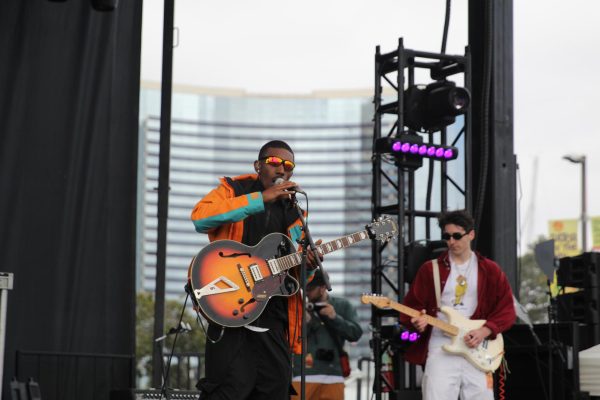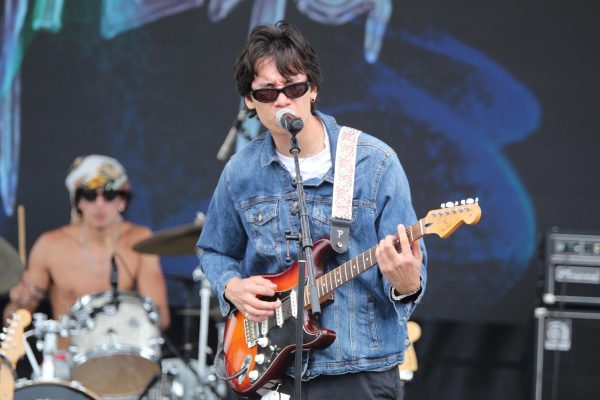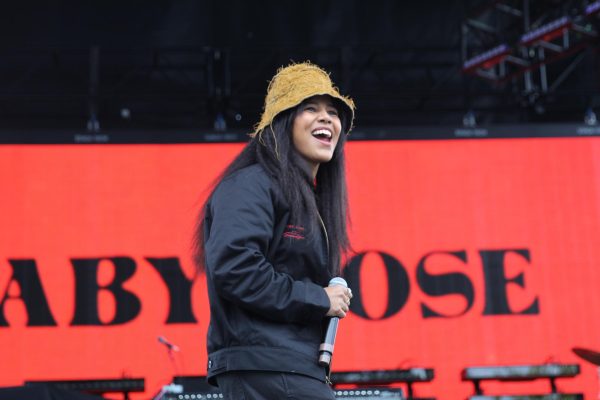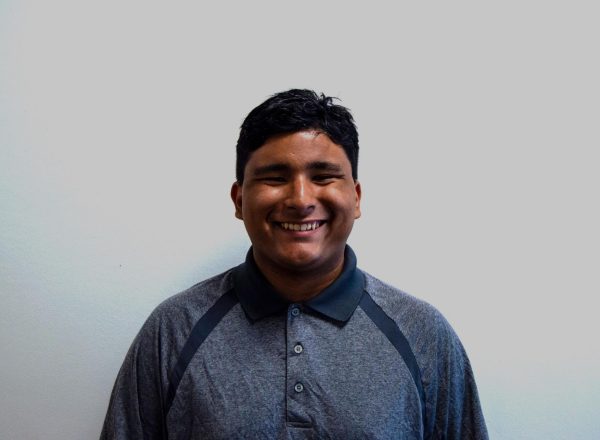It was a sunlit, music-soaked weekend on San Diego’s waterfront, where yacht clubs hummed behind the haze of soundchecks and a salty breeze clung to guitar strings. Wonderfront 2025 brought the good times, but behind the shimmering performances, a quieter thread ran through nearly every artist interview I conducted: being an artist in today’s music industry means wearing too many hats, and most don’t fit.
Not one, not two, but all seven artists and bands I interviewed—bLAck pARty, BabyJake, Saint Luna, Baby Rose, Peter Cat Recording Co., Benches, Paco Versailles and Vacations—shared variations of the same truth: managing a music career today means managing an online persona, an algorithm, a stream count, and an attention span. And for many of them, it’s exhausting.

“You kind of have to be an artist and a content creator to exist in people’s minds”
bLAck pARty’s Malik Perry Flint put it bluntly when I asked what people misunderstand most about being an artist right now.
“It’s kind of tough being an artist, because… It’s kind of like being an influencer,” he said. “You kind of have to be an artist and a content creator to exist in people’s minds a little bit.”
Campbell Burns of Vacations echoed this sentiment almost word-for-word, making it clear just how hollow and cynical that digital grind can feel.
“Every artist goes through it,” he said. “‘You have to make another TikTok’—I don’t want to do that. I don’t want to spend five or six hours being like, ‘Hey, this is what I get up to in my day.’ I’m like, I just don’t care.”
Burns originally leaned into meme-posting as a sort of ironic protest.
“I put in as little effort as possible, but it had maximum return,” he admitted. But that irony only worked because fans saw it as authentic. Still, he later stopped altogether: “You become known more for the meme than you do your art… That feels like a bit of a disconnect with how people engage with art in the first place.”

“It sucks your soul a little bit”
Saint Luna—one of San Diego’s most promising young rock acts—spelled it out for local student musicians hoping to “make it.” “Don’t forget about posting on social media,” lead singer Bradyn Jace said. “That shit works. It’s annoying and it takes a lot of time, and it sucks your soul a little bit.”
They’re not exaggerating. Posting isn’t just about staying relevant—it’s about surviving in an ecosystem that rarely develops artists anymore.
“It’s not the 70s or 80s anymore. You can’t just play shows to get noticed,” Jace said. “You have to have a product that is worthy in value… No one wants to develop artists anymore.”
BabyJake, who’s spent nearly a decade in the industry, offered a similar perspective.
“It never came naturally to me,” he said. “I was always a writer first and music guy first. I wasn’t like a streamer or a YouTuber or a TikToker or a content creator.” He’s lucky enough now to have a fanbase that doesn’t demand as much of that, but early on? “It was definitely difficult.”
For Baby Rose, the issue goes deeper. Her rejection of the algorithm is rooted in principle.
“We live in a very capitalistic society that doesn’t look at art for healing or intention,” she said. “It looks at it as a commodity to be bought and sold. And the quickest way to lose your love and passion for something is to feel like you have to do it to meet a quota.”

(Isabella Biunno)
“The digital world interferes with everything”
Paco Versailles, the genre-bending duo of flamenco guitar and French house rhythms, perhaps summed it up best.
“The whole digital world interferes with everything,” said Ryan Merchant. “It sucks away your creative energy. It sucks away mental energy. If you get too absorbed with it, the music is going to suffer.”
They were refreshingly honest about the trade-offs.
“It’s a necessary evil,” Merchant said. “It can be a marketing driver, so we’re always struggling with it. We’re trying to focus on the music, but there is a time and place where you have to suck it up and make some interesting video content because that’s part of the storytelling aspect of music, whether you like it or not.”
Even Peter Cat Recording Co., whose sardonic detachment bordered on existential comedy, couldn’t help but mention the absurdity of modern artistic labor.
“We’re in it for the money,” lead vocalist Suryakant Sawhney joked, “but music is the worst business to pick money in.” Their dry irony says what many are afraid to: we all pretend this is sustainable.
“The grind isn’t glamorous”
Let’s not sugarcoat it. BabyJake was one of the few to actually say what others only hinted at.
“I wish that people understood it’s a real f***ing job. It’s a regular job… people think tour is you go, you play, you get fed up. You go drink, you go party, sleep around, whatever… It’s really not like that. I don’t even drink anymore—I’m sober.”
The grind isn’t glamorous. He described three-to-four-show stretches, 18-hour drives, sleepless nights and the logistics nightmare behind every “effortless” performance.
“Actually, 10% of it’s fun. 90% of it’s like… you’re driving a f***ing van or bus or flying or coordinating or nursing bad days,” he said.
Another San Diego local band, Benches, echoed this same reality: “A lot of it would pertain to a lot more work than you expect,” bassist Evan Ojeda said. “It’s not just fun and games. Sound checks and everything..it could be stressful at times.”

So what now?
Nobody in these interviews asked for sympathy. They love what they do. But if you truly want to support artists in 2025, start by letting go of the illusion that they exist to feed your feed.
Respect the slow burn. Understand that your favorite song might’ve taken two years of creative anguish to make. Give artists space to breathe, disappear, experiment, and come back new.
As Baby Rose put it: “We don’t need more art that’s devoid of love and passion and intention… We need things to give people a sense of hope and a sense of power.”
Maybe that starts with letting artists be artists, not influencers.









